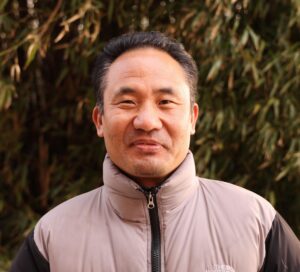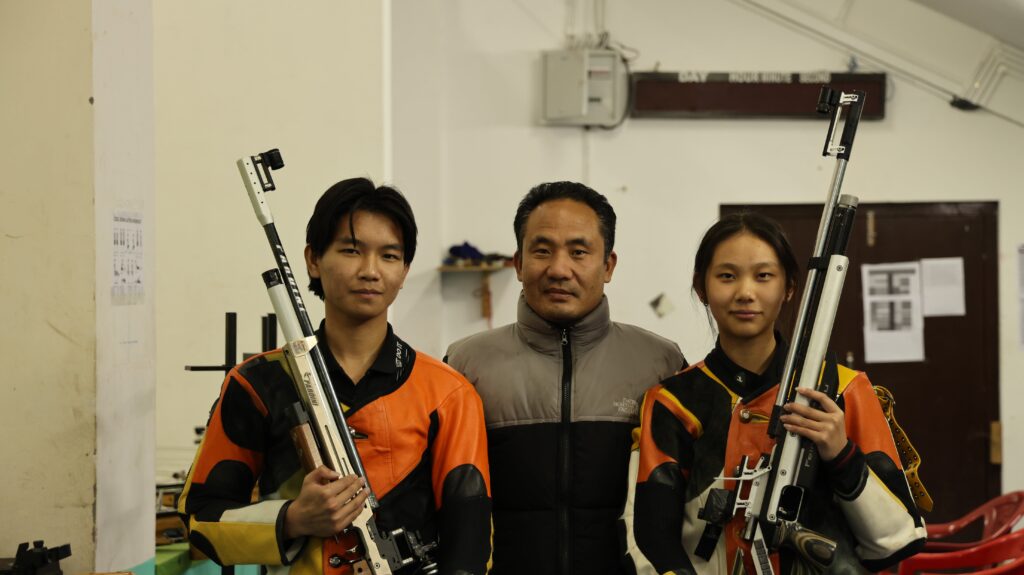
Coach Dorji Phurba, BHUTAN SHOOTING FEDERATION
The best coaches don’t create champions; they create believers. And when you believe in yourself, the target becomes just another step in your journey.
Reading Time: Approximately 5 minutes – A short read to inspire your day with the story of a man who turned challenges into opportunities, one shot at a time.
A small room in the Bhutan Shooting Federation office, filled with medals, photographs, and the quiet hum of focus. Coach Dorji Phurba sits with a warm smile, his eyes lighting up as he gestures to a framed picture of his team. His voice is steady, but you can sense decades of stories tucked behind his calm.
Coach Dorji Phurba stands as a cornerstone of Bhutan’s shooting sports, dedicating over two decades to its development. His journey began in 2002 when he joined the Bhutan Shooting Federation as an athlete. Transitioning to coaching, he has been instrumental in nurturing talents like Lenchu Kunzang, who represented Bhutan in the 2012 and 2016 Olympics.
Beyond coaching, Phurba has played a pivotal role in promoting inclusivity in sports, notably supporting Kinley Dema, Bhutan’s first female Paralympic shooting trainee. His unwavering commitment continues to inspire and shape the future of shooting sports in Bhutan.
This heartfelt interview was conducted by Victor Gurung, Media & Technical Lead Consultant
Q: Coach, your journey started in 2002. Take us back to that moment. What drew you to shooting?
(Laughs softly) You know, I was just a kid fresh out of high school, unsure of what to do next. My family needed support, and higher studies weren’t an option. Then I saw that ad in 2002– “Looking for shooters.” I thought, “Why not?” It felt like a sign.
I was searching for something meaningful—an opportunity to support myself while doing something I could be passionate about. That’s when I saw an announcement from the Bhutan Olympic Committee. They were looking for five male and five female shooters under their New Talent Identification Program.
Shooting wasn’t just a sport; it was a way to stand on my own feet, to belong somewhere. When I got selected, I remember thinking, “This is it. This is my chance to build something.”
Q: Two years later, you’re at the South Asian Games in Pakistan. What was that like for a young athlete?
Oh, it was overwhelming! Me, a boy from Bhutan, suddenly competing internationally. I felt proud but also… small.
Within two years, I had the honor of representing Bhutan at the 9th South Asian Games in Islamabad, Pakistan, in 2004. That experience opened doors to even greater opportunities, including professional training in Germany under an exchange program between the Bhutan Olympic Committee and the German Shooting Federation. That training transformed me—not just as an athlete, but as a person.
I realized shooting wasn’t just about talent – it was about patience, repetition, trusting yourself. But back then, I never imagined I’d end up coaching.
Q: Speaking of coaching – how did that happen? You weren’t planning on it, right?
(Pauses, voice thick) No. Life has its own plans. Our coach left suddenly, and the federation asked me to step in. I was terrified. “Me? A coach?” I almost said no. But the athletes… they were like family. How could I walk away? So I said yes, and for years, I did everything – coaching, cleaning, paperwork. I even scrubbed toilets! (chuckles) But those early days taught me humility. To lead, you have to understand every part of the journey, even the messy ones.
Q: You’ve trained athletes like Lenchu Kunzang, who made history. What keeps you pushing them – and yourself?
Ah, Lenchu. That girl has fire. At the 2013 South Asian Games, she missed the bronze by 0.03 points. (He looks away, composing himself) When she stepped down, she didn’t cry. She said, “Next time, Coach.” That’s what drives me – their courage. Every day, I ask myself, “How can I give them what I never had?” Some days it’s fixing their stance; other days, it’s just listening. Coaching isn’t about medals. It’s about making them believe they’re capable of more than they know.
Q: You have achieved the highest level of coaching certification. How was that journey?
Once I took on coaching, I knew I had to push myself further. I pursued my professional certifications, completing levels D, C, B, and finally A—the highest level in shooting. For my B and A certifications, I was awarded merit for my contributions and performance as a coach. It wasn’t just about getting certified. It was about proving to myself that I could grow, that I could give my best to my athletes.
One of the most rewarding moments was seeing my athlete, Lenchu Kunzang, perform at the highest level, representing Bhutan in international tournaments, including the Olympics. It made every struggle, every challenge, and every long day worth it.

The best coaches don’t create champions; they create believers. And when you believe in yourself, the target becomes just another step in your journey.
Q: In 2014, you took a break from Bhutan Shooting Federation and went abroad. What made you do that?
As a coach, there comes a point where you feel saturated—you need something to challenge you again. I wanted to test myself in a different environment, so I took two years of leave and went to Kuwait to coach grassroots and youth development programs. It was an eye-opening experience. Coaching in a foreign country made me see the sport from new perspectives, and I learned so much.
The Kuwait Shooting Federation even offered me an extended contract. But in the end, my heart pulled me back home. My athletes needed me, and I needed them. I returned to Bhutan to use my experiences and exposure to build something stronger for our youth.
Q: You have been part of so many major tournaments. Which moments stand out the most for you?
There are so many memories. The 2012 London Olympics, where I accompanied Kunzang Choden on her wildcard entry, was unforgettable. The Rio Olympics in 2016, ISSF World Cup in 2018, and World Shooting Para Sport World Cup were all milestones in my career.
But one moment I will never forget is the 13th South Asian Games. Lenchu Kunzang was so close to making history—she missed the bronze medal by just 0.03 points and finished fourth. That day is still in my heart. It was heartbreaking, but at the same time, it showed us how close we are to reaching the top. That moment fuels me to push harder every single day.
Q: What keeps you going after all these years?
It’s the love for the sport and my athletes. I wake up every morning thinking about how I can make them better. Coaching is not just a job for me—it’s my passion, my commitment.
I won’t lie, there are tough days. There are days when things don’t go as planned, when results don’t come, when doubts creep in. But then, I remember why I started. I see the players putting in their effort, and that’s all I need to push forward.
Every evening, when I leave the office, I tell myself, ‘Tomorrow, I will do better.’ And that’s what keeps me coming back, every single day.

Q: What is your dream for Bhutanese shooting?
My dream is simple—to see Bhutan make a mark on the world stage. I want our shooters to stand on podiums, to bring home medals, to show the world that we may be a small nation, but we have big talent. More than that, I want to create a system where young shooters get the right support, training, and opportunities to excel.
Now, my mission is to give back and build something that lasts beyond me. And I won’t stop until that dream becomes a reality.
Discover our newest blogs, news, and announcements—curated just for you. Stay informed and inspired!
